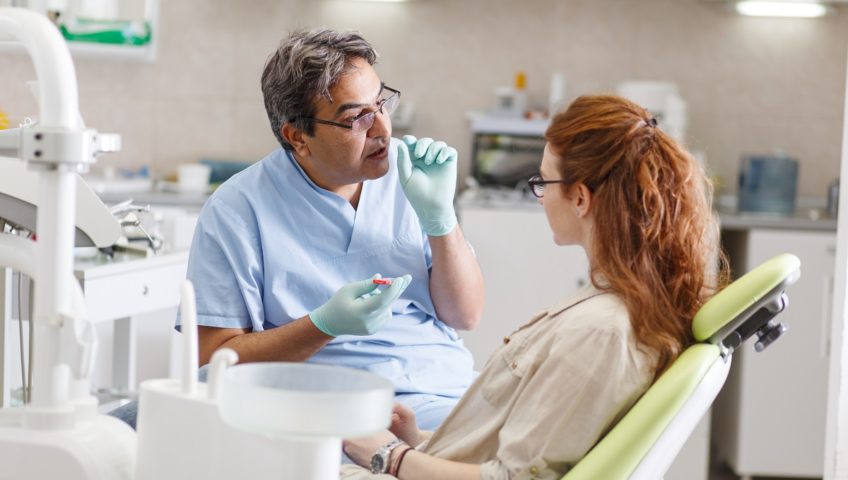Despite epidemic levels of gum disease in the United States – the majority of adults having some level of gum disease – most of us are unaware of the signs, symptoms or even why it is important to be treated. We’ve brought together a panel of experts to answer your gum disease questions. February is Gum Disease Awareness Month – it’s time to be more informed on this all too common disease.
WHAT IS GUM DISEASE?
Robert H. Gregg II, DDS (Cerritos, CA): Gum disease, also known as periodontitis, is an infection of the tissues and bone that support your teeth. 85% of US adults suffer from some form of gum disease, making this an epidemic and one of the most common diseases in America. Unfortunately, only about 3% of those with moderate to severe gum disease are treated.
Jeffrey Dolgos, DDS (Orchard Park, NY): Periodontal disease is an inflammatory condition which allows invasive microorganisms to get inside your body through the crevices between your teeth and gums. It is a breakdown of the boundary between you and the outside world, and without a strong boundary, any organized system will decay.
Ann Astolfi, DMD, PC (Bethlehem, PA): Basically, what isn’t brushed or flossed off the teeth can create a quiet firestorm within the gum and it spreads very insidiously without patients being aware of it.
WHAT ARE THE SIGNS & SYMPTOMS OF GUM DISEASE?
Stephen Brown, DDS (Philadelphia, PA): Gum disease is often not obvious, and symptoms may be unrecognized until the condition is very advanced. Some of the most important warning signs are:
- Red, swollen and tender gums
- Bleeding while brushing and flossing
- Pus or drainage from the gums
- Receding gums, causing the teeth to look longer or become sensitive
- Loose teeth or increased spacing between them
- Persistent bad breath
- Teeth that no longer mesh together evenly when you chew
Astolfi: It’s unfortunate that the signs and symptoms for a patient to recognize gum disease are so advanced before it becomes obvious.
WHAT ARE THE EFFECTS OF GUM DISEASE ON THE REST OF MY BODY?
Mark Wilson, DDS, MS (Minneapolis, MN): Any type of chronic inflammation in the body triggers immune system responses, which can cause heart disease, cancer, intestinal issues, low birth-weight babies; it seems like every few months a new association between gum disease and other illnesses comes up. It affects probably everything in the body.
Sarah Oshman, DMD (Fishkill, NY): A lot of young women and new mothers don’t realize that when they become pregnant or when they’re taking oral contraceptives, they have an increase in hormones in their body that can affect their oral health. You become more sensitive to the plaque and bacteria in your mouth and have an increased response to it, so it’s extra important to take of your gum health when you’re going through these hormonal changes, including your regular cycle.
Gregg: Gum disease has shown alarming links to men’s overall health, as well. 53% of male patients with erectile dysfunction also suffer from severe gum disease, and men with gum disease have higher levels of Prostate-Specific Antigen, which is a factor in developing prostate cancer.
WHAT IS THE IMPORTANCE OF BEING TREATED?
EJ Traynor, DMD, MS (Greenwich, CT): It’s really important to treat your gum disease. The main reason, of course, is because you want to save your teeth. Just because it doesn’t hurt you doesn’t mean it’s not causing destruction to your mouth and the rest of your body.
John P. Gallardo, DDS (Miami, FL): I want patients to know that gum disease is not normal. Gum disease doesn’t hurt, so unless you have signs and symptoms like bleeding, you won’t know you have it. I want the public to know that prevention is everything. You want to make sure that you get down to the root of the problem before it manifests into damage to the bone, damage to the gums, and turns into your natural teeth becoming loose. It’s important to understand this disease can change their life in a negative way if not treated.
Dolgos: Periodontal disease happens when we don’t take care of our mouths. It’s really that simple. Take a few minutes a couple times a day to only pay attention to your gums and your teeth, cleaning them carefully, examining them in a mirror, brushing them gently yet thoroughly, flossing them meticulously, and feeling them with your tongue, and you will all but eliminate your risk of developing periodontal disease. When you care for your teeth and gums like you love them, and appreciate them, and they will respond with health and vitality.
ABOUT OUR PANEL


